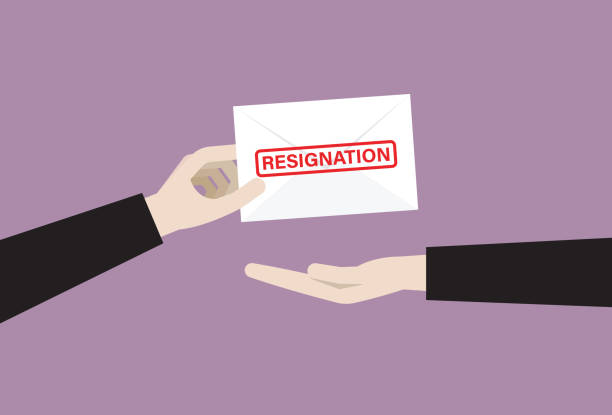One of the most important aspects of leaving a job is providing your employer with a resignation letter to initiate your notice period. Employees are expected to give reasonable notice and continue working until their notice period ends.
The notice period gives the employer time to adjust their workforce planning, including hiring a replacement or reallocating resources. In this article, we break down exactly what’s expected from the employee from a legal point of view and good practices for leaving a job.
How much notice do you need to give in Ireland?
Most companies will include information about resignation procedures in Ireland as part of your employment contract. This may vary between companies but is typically between one and four weeks. Your first step should be to check the terms of your contract, as this is a legally binding agreement between the employee and the employer.
It’s a good idea to know your notice period when you start looking for a new job, as your potential employers will need to know this. If you’re considering a career change or seeking new opportunities, Recruit Ireland is an excellent resource. Recruit Ireland offers a wide range of job listings across every industry in Ireland, making it easier for you to find a role that suits your skills and career aspirations.
What is the statutory notice period?
If your contract doesn’t state a notice period, you are still bound by Irish law to provide a minimum of one week’s notice. This is set out in the Minimum Notice and Terms of Employment Acts 1973 – 2005. In section 6 of the Act, states an employer is,
“entitled to not less than one week’s notice from an employee who has been in his continuous employment for thirteen weeks or more of that employee’s intention to terminate his contract of employment.”
The Act states that the exceptions are if you’ve been with the company for less than 13 weeks or if there’s no contract specifying a notice period.
How to determine your notice period
Any notice period should cover the terms agreed in your contract. For example, if the contract states that an employee must give a month’s notice, you will be expected to work during this time. Some roles, particularly high-skilled positions where people are not easily replaced, could have a 3-month notice period as part of the contract.
The notice period starts from the date you hand in your letter of resignation. If you’re switching to a new job, leave enough time to cover your obligations to your current employer.
Not following proper procedures can have a detrimental effect on your relationship with your current place of work. You may need to rely on them in the future for a reference, so maintaining a positive relationship is a good idea.
Do I need to work my notice period?
In most cases, yes, you must work your notice period. However, you may be able to negotiate different terms with your employer, but this will likely be on a case-by-case basis.
If you have an outstanding holiday, you can request to be paid in lieu. Your employer doesn’t have to accept this request, but if they do, you can use your outstanding holiday days to bring your final date forward.
It’s also possible to waive the right to notice if both parties are willing to agree on new terms. As with outstanding holidays, your employer is not obligated to accept this request, but if they do, it’s possible to renegotiate your end date.
Can I resign due to mental health?
You do not need a reason to leave any job, including for mental health reasons or if you’re suffering from burnout. Psychologist Lee Chambers suggests that if your work environment poses a threat to your personal safety or well-being, it will negatively impact your overall health.
“If work is causing you significant mental or physical distress, perhaps because of bullying or chronic overwork, it may be that you have to quit”
However, it’s important to note that standard resignation terms will apply to those leaving because of their mental health. You’ll need to work your notice period unless agreed with your employer.
If you’re on sick leave when you decide to resign, you’ll need to follow the same procedure as you normally would. Hand in your notice to your line manager as usual. If your Doctor has signed you off on long-term sickness, you won’t be expected to attend work for the duration of the sick note.
On the other hand, if you are signed off sick after handing in your notice, your employer must treat you the same way as any other employer, including honouring the sick note.
Can I resign with immediate effect?
With respect to the law, there are only two situations where you can resign with immediate effect:
- If you’ve been working with the company for less than 13 weeks
- If there’s no contract specifying a notice period
However, it would help if you still considered offering the statutory minimum period of one week to maintain a positive relationship with your boss and the company. Resigning without giving notice can be mentioned in a reference, which may lower your chances of getting new job offers.
Speaking with your line manager and trying to come to an agreement is the best way to negotiate an immediate release. If you can explain the reasons for reducing your notice period clearly and professionally, your line manager may be able to discuss a mutually beneficial arrangement.
What happens if I don’t give the correct notice period?
If you leave without working your notice, your employer could take you to court over loss of earnings. Proving loss of earnings can be difficult, so it’s unlikely an employer would choose to pursue legal action.
However, breaking your contract in this way could still have professional repercussions. It’s likely to lead to a negative reference from the employer, which may harm your ability to find work in the future.
Leaving without proper notice can also affect professional relationships, including your colleagues, who will be left without your support during the transition. If you are in a position where you can’t fulfil the entire notice period, the best thing to do is communicate openly with your line manager or HR department.
Employment law in Ireland – Notice periods
Notice periods are covered in the Minimum Notice and Terms of Employment Act 1973 – 2005 and covers the law for employers and employee rights in Ireland.
Section 6 of the Act covers the employer’s right to notice, namely the statutory minimum of one week.
The Act also covers instances where notice periods may not apply, including:
- Section 7 – Right to waive notice:
- The Act doesn’t prevent an employer or employee from waiving their right to notice or accepting payment in lieu
- If an employee accepts payment instead of notice, their termination date will remain the same date it would have originally expired.
- Section 8 – Right to terminate contract of employment without notice:
- The Act doesn’t prevent the employee or the employer from terminating the contract on the grounds of misconduct from either party.
Employers who fail to give the correct notice may face claims for unfair dismissal or be required to pay compensation. If your employer has made you redundant, they must adhere to the notice period and offer a redundancy package based on your years of service.
The employee and the employer should honour the notice period terms stipulated by law and the employment contract.
How to correctly hand in your notice
Handing in your letter of resignation is a multi-step process. Here’s the best way to handle your exit from a company:
- Check your contract for the required length of your notice. If there’s no notice period in your contract, you must provide your employer with a minimum of one week as per Irish law.
- Prepare a formal letter of resignation, which can be written and signed or emailed. You must clearly state your intent to resign and provide your last day of employment.
- Ask your line manager for a short meeting to let them know you’ll be moving on from the company. If you don’t want to speak to your line manager about this, you can organise a meeting with the company’s HR team.
- If you’re seeking any adjustments to the terms of your notice period, explain why you can’t work the full notice period and negotiate a new agreement.
A face-to-face conversation shows professionalism and respect, allowing for a more personal and direct exchange. This approach can help maintain a positive relationship with your employer, which is beneficial for future references and or a return to the company.
Conclusion
Notice periods in Ireland are a requirement of law, so it’s always good practice to work the terms set out in your contract. If you’re looking for a new job, Recruit Ireland’s executive job board is an excellent resource for exploring new opportunities.
Your new employer will understand you have a notice period to work through; they may want to know how long this will be when they make a job offer. Check your contract to ensure you can meet your obligations to the new and your current employer.










